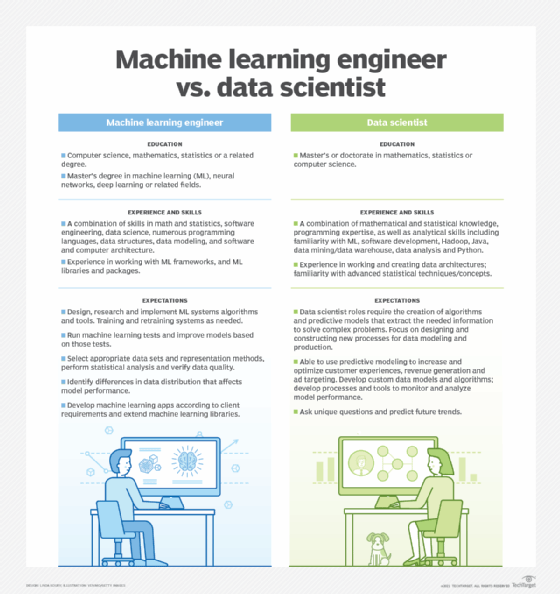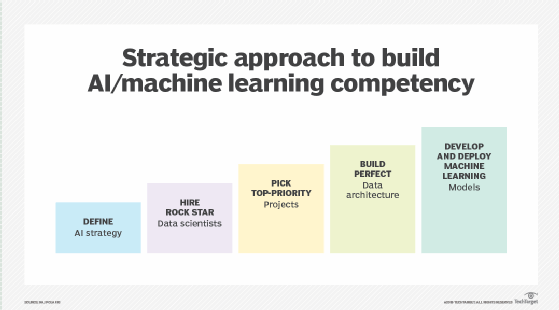
olly - Fotolia
4 AI career path trajectories for IT professionals
As the desire for AI and machine learning in-house skills skyrocket, those looking to break into the market have a variety of career path options, including AI architect and BI developer.
AI projects are often derailed by the lack of in-house critical skills and the data scientist shortage. As organizations integrate AI, natural language processing and machine learning into their products and services, the need for skills and talent is pressing organizations to hire for new roles.
As a result, job seekers are finding an exploding job market for data science skill sets. Companies are trying to hire experts in artificial intelligence; however, there are increasing skills gaps as the need for these roles increasingly outweighs the supply.
According to a report by Gartner, AI-related fields are estimated to create about 2.3 million jobs by the end of this year. However, there are a collection of roles that are more crucial than others, and those interested in working in the field should take note of the importance of how backgrounds in data science, business analytics and mathematics are manifesting in four trending AI career paths.
Data scientist
A data scientist is responsible for gathering data and analyzing it. Data scientists have backgrounds in advanced math and statistics, advanced analytics, and machine learning and AI. In an enterprise setting, data scientists extract useful information from a sea of data. In analyzing the data, they make inferences and gather insights and use them to help the business.
Over the past five years, the need for data scientists has increased by 35%. This sudden increase in demand for data scientists has led to the talent crunch that we're seeing across many enterprises and organizations.
Surprisingly, though the requirements are straightforward (i.e., a computer science degree, proficiency in code), the role of a data scientist is loosely defined across the job market, and job descriptions can vary widely. Those interested in becoming a data scientist at any organization will need experience and backgrounds in statistics, probability, mathematics and algorithms as a base level of qualifications.

Machine learning engineer
A machine learning engineer is a software engineer who has specialized in machine learning. This role helps to establish machine learning processes, deploy machine learning into production and optimize products for performance and scalability. The primary role of the machine learning engineer is to wrangle the various tools needed to train, generate, evaluate, iterate and manage machine learning models in the training phase as well as the inference phase.
While data scientists are primarily focused on data and the environments for managing data into models for a wide range of purposes -- not necessarily just AI -- machine learning engineers are focused specifically and solely on the challenge of machine learning model generation. While data scientists can assume the role of machine learning engineer, it's much harder for a purpose-focused machine learning engineer to become a data scientist without more general data science knowledge.
A machine learning engineer needs to possess knowledge of computer science, statistics, various programming languages, machine learning, deep learning, applied math and other skills associated with engineering and AI. In general, a machine learning engineer will need to have a general understanding of various other parts of AI. In addition, machine learning engineers need to have a firm grasp on the different tools available for the machine learning model lifecycle and keep up to date with the changes in the AI vendor landscape.
Business intelligence developer
A more obscure role that is increasingly gaining visibility is that of the business intelligence developer. Emerging from roots in business intelligence (BI) software, a BI developer is focused on the development of presentable data views that the business decision-makers can use to gain a better understanding of primary areas of concern. BI developers use primarily software tools focused on BI, portal, dashboard and data analytics software suites, and use those tools to generate summaries, dashboards, reports, graphs, maps, charts and other data visualizations.
A business intelligence developer uses software tools to transform data into useful insights that help business decisions. This role is a combination of both business professional and AI professional. One of the major responsibilities of business intelligence developers is to take data and break it down to get business insights. They need to have knowledge of BI tools to help them access and analyze data sets and then present analytical findings to provide detailed reporting.
Business intelligence developers need experience to understand business needs, and they also need an understanding of SQL and relational databases, as well as BI skills and some coding experience. While the term "business intelligence developer" seems to be the term that's gaining traction, perhaps in the longer term this role might be better known as data visualization engineer or data user experience supervisor.

AI architect
The role of an AI architect is distinct from that of the machine learning engineer and data scientist, and organizations look to hire AI architects in addition to these other roles. AI architects are responsible for the overall needs of artificial intelligence projects. This role is responsible for creating and maintaining architecture using leading AI technology frameworks. This role has aspects of data science, solutions specialist and technology expert all wrapped into one position.
In many ways, the AI architect is to an AI project as an enterprise architect is to IT projects. The enterprise architect is a distinct role focused on overall strategy, planning and coordination using best practice methodologies. So too is the AI architect focused on the overall strategy, planning and coordination using emerging AI-focused methodologies.
AI architects need to look at the big picture of an AI deployment project to understand overall mission objectives, know the different approaches to apply AI to those objectives and coordinate teams to accomplish those goals.
They also need to recognize how the AI is used in an organization, which requires a deep understanding of the various AI patterns, capabilities of AI platforms and the condition of data in the organization. Because of these requirements, an AI architect is not an entry-level position, but rather one that requires years of experience in the field.
Increasing demand for AI roles show no sign of slowing
Over the past several years, the AI job market has seen incredible growth and roles for AI specialists have seen increasing demand.
Market intelligence firm IDC forecasts worldwide revenues for the AI market will grow more than 16% year over year in 2021 to $327.5 billion. The firm expects revenues to grow to more than $500 billion by 2024.
Something to consider when looking at these high-demand jobs is the core skills and requirements of each job listing. Some of these roles require deep expertise in certain technologies, such as deep learning, predictive models or natural language processing, plus expertise in math and engineering or years of business experience.
It's not easy to learn these skills over a weekend or casually educate yourself. If you're interested in learning new skills, many universities have begun to offer courses in machine learning, deep learning and other AI techniques. Many universities have paired with well-known AI and analytics vendors, including DataRobot and Alteryx, to teach courses aimed at educating students on how to use these specific platforms.
Many AI and analytics vendors directly offer free or relatively inexpensive online training courses on how to use their platforms. The vendors tend to give people that complete the courses certifications that they can add to their resumes or LinkedIn profiles.
Online learning platforms such as EdX and Udemy also offer relatively cheap courses on AI concepts, platforms and techniques. Many AI platforms have active community boards, where experienced users offer newcomers advice on how to use the platforms and answer questions they may have.
Knowing the most needed positions can help to prepare you to enter the industry or plan the continuation of your career.







